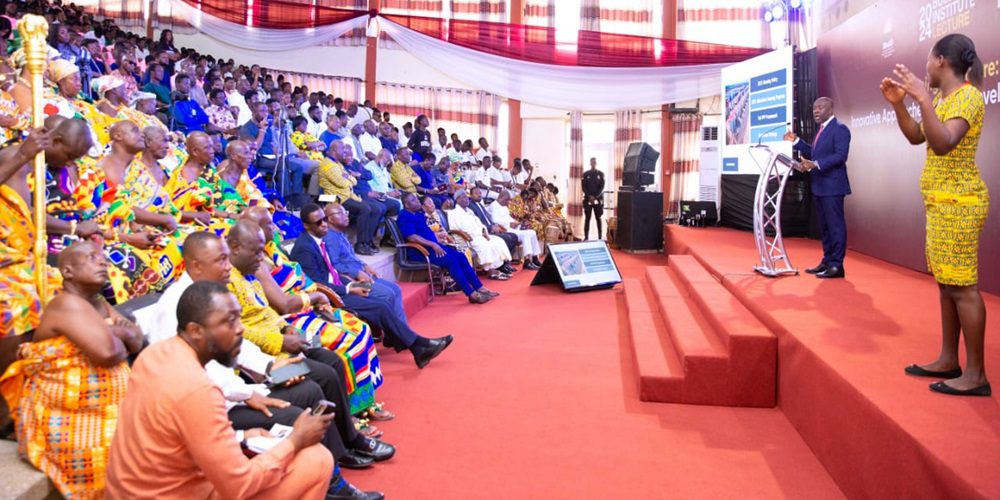Government is set to commence its highly anticipated district-level housing projects, aimed at addressing the nation’s significant housing deficit.
This initiative was unveiled by the Minister for Works and Housing, Kojo Oppong Nkrumah, during the Busia Institute Lecture at Takoradi Technical University.

The programme is designed to tackle Ghana’s 1.8 million housing gap by decentralizing housing development and tailoring solutions to the specific needs of each region.
In his keynote address, Minister Oppong Nkrumah emphasized that the initiative is not just about building homes but also about creating a framework for sustained regional growth.
“Our vision is to decentralize housing development, making it accessible and manageable at the district level,” he stated. “These projects will ensure that every district has the infrastructure to meet its housing needs and provide a solid foundation for future growth.”
He highlighted that the programme will include a variety of housing units, ranging from low-cost apartments to larger family homes, designed to cater to different income levels and needs.
He noted that the project would offer localized solutions to housing problems while simultaneously creating job opportunities for the youth.
“Our nation’s housing challenges require localized solutions,” he said, presenting a vision for district-level housing projects aimed at expanding the availability of affordable homes while considering the unique characteristics and needs of each region.
The lecture, attended by a distinguished group of dignitaries including Western Regional Minister Kwabena Okyere Darko-Mensah; Vice-Chancellor of Takoradi Technical University, Rev. Prof. John Frank Eshun; Chairman of the Wassa Amenfi Traditional Area, Tetrete Okuamoah Sekyim II; and Executive Director of the Busia Institute, Anane Agyei, provided a robust platform for discussing the strategic measures necessary to address housing challenges across the country.
Western Regional Minister Kwabena Okyere Darko-Mensah commended the initiative, noting its alignment with regional development goals.
“The district housing projects align perfectly with our regional development goals,” he said.
“This approach will not only address the housing deficit but also enhance regional infrastructure and boost economic activities.” He expressed optimism about the positive effects the projects would have on local communities, including increased employment opportunities and improved living standards.
Mr Darko-Mensah also underscored the importance of integrating regional development plans with national housing strategies to maximize impact.
Vice-Chancellor of Takoradi Technical University, Rev. Prof. Eshun, praised the government’s emphasis on inclusive and sustainable development.
He highlighted the university’s commitment to supporting initiatives that drive regional growth and development, noting that the district housing projects represent a crucial advance in providing safe and affordable housing for all Ghanaians.
Prof. Eshun also affirmed the university’s willingness to engage in research and development efforts to ensure the success of these projects.
Tetrete Okuamoah Sekyim II, Chairman of the Wassa Amenfi Traditional Area, underscored the significance of involving communities in the housing projects.
He expressed enthusiasm for the chance to collaborate with the government on these initiatives, stressing the need for local communities to be actively engaged in both planning and execution.
Tetrete Sekyim II noted that this approach ensures that the projects address specific community needs and contribute to sustainable development.
He also urged traditional authorities to facilitate land acquisition to support the implementation of the projects.
Executive Director of the Busia Institute, Anane Agyei, expressed appreciation for the government’s commitment to addressing housing issues.
“The Busia Institute is dedicated to promoting policies and initiatives that improve the quality of life for Ghanaians. We welcome the district housing projects and are prepared to support their success through research, advocacy, and stakeholder engagement,” Agyei stated.
He emphasized the importance of ongoing dialogue and collaboration among all stakeholders to ensure that the projects achieve their intended outcomes.
The district housing scheme is poised to significantly impact Ghana’s housing sector, providing affordable and sustainable housing solutions while fostering regional development and economic growth.
- Commonwealth lawyers demand reversal of CJ’s suspension - 10 May 2025
- Cedi to resume depreciation in late 2025, S&P warns - 10 May 2025
- Debt restructuring, IMF deal, gold surge propel Ghana to S&P Upgrade - 10 May 2025




